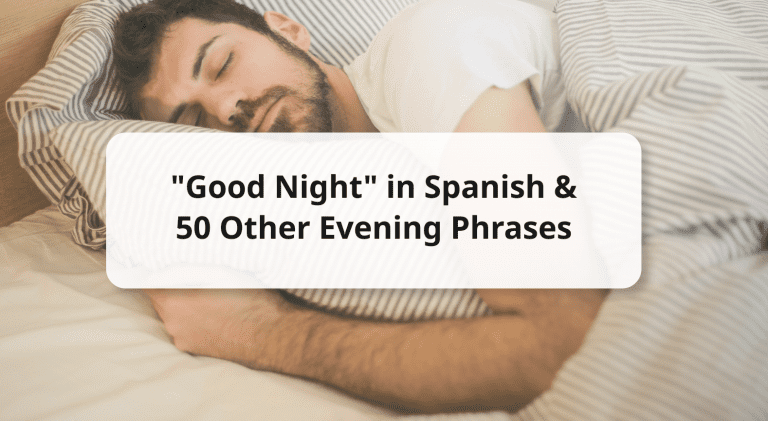Why would you want to know different ways to say good night in Spanish? It comes down to what situation you are in and, also, having fun with the language. A simple buenas noches (good night) will suffice in most situations, but what about “sweet dreams?” Wouldn’t you want to personalize your greeting?
Forget about learning how to say good night in French—Spanish is the real language of love. Customize your goodnight greetings and improve your conversational Spanish with the whopping 50 phrases below. Master greeting your friends, family, and hosts, and learn how to play with idioms.
Good Night in Spanish
Buenas noches, is the most basic greeting in Spain and Latin America after sunset. What’s the difference then between good evening and good night in Spanish? It’s the same thing! Regardless, when the sun has set, it’s noche.
It’s a very straightforward phrase. Buenas means “good,” so…”good night.” As in English, since there is no verb present, there is no conjugation to worry about.
The same counts for “good morning in Spanish” as well as “good afternoon”—you would say buenos días (mornings) and buenas tardes (afternoons).
Other Ways to Say Good Night in Spanish
Although English and Spanish might seem very different, they both come from the same language family (Indo-European). It is therefore not surprising that many words bear a resemblance to each other. It is still necessary to work towards learning as many Spanish words as possible, but some will seem familiar or downright identical to what you already know.
Words like “little” in Spanish (insignificante when you’re speaking of little matters) or “fresh” (fresco when talking about food) are easy to understand if you know the context. On the other hand, you might need help when confronted with variations of “good night” in Spanish. Below, we have made it easier for you with several ways to greet someone at the end of the day, so vámos (let’s go)!
1. Have a good night – Ten unas buenas noches
If you want to be more complete in your phrasing, ten unas (have a) buenas noches is your friend. You can also use:
- Qué tengas buenas noches (meaning exactly the same but used informally with friends)
- Qué pases buenas noches (when greeting someone new or speaking to someone in authority)
- Espero que tengas una buena noche (when being polite, as it literally means “I hope you have a good night”)
They all mean good night in Spanish. You will have to decide the most appropriate phrase depending on the setting.
2. Sweet dreams – Dulces sueños
This is an easy one to remember if you’ve ever come across a sweet treat containing the word dulces, as it literally means “sweet.” Throw in sueños (dreams), stop worrying about conjugations, and you have “sweet dreams.”
This is obviously used with a significant other but can also be used with close friends.
- Dulces sueños. (Sweet dreams.)
- Buenas noches, mi amor. Que tengas dulces sueños. (Goodnight, my love. Have sweet dreams.)
3. Have a nice rest- Que descanses
This is how you could reply to someone saying good night in Spanish. It also means “get some rest” so, if you want to be a smart aleck, you could say:
- Buenas noches. (Good night.)
- Que descanses. Te ves cansado. (Get some rest. You look tired.)
4. Sleep well – Duerme bien
When you’re telling (commanding) someone to sleep well, you use the imperative conjugation of “to sleep”, ie. duerme. When you hope someone sleeps well, you use the subjunctive conjugation: duermas.
- ¡Duerme bien! ((You must) sleep well!)
- Que duermas bien. ((Hope you) sleep well.)
5. May you Have a Good Night – Que pase unas buenas noches
Another formal and polite way to say good night in Spanish, is by saying “Que pase unas buenas noches”. While this phrase could be used within your Spanish family, it’s most often used with strangers or older people.
- Que pase una buenas noches, señor (Have a good night, sir!)
- Nos vemos pronto, que pase una buenas noches (See you soon, may you have a good night!)
6. Goodnight beautiful – Buenas noches hermosa
Being the true language of love (don’t tell my French colleagues), Spanish has assigned many words that would usually be reserved for a specific gender in English, to both genders.
Buenas noches hermosa (good night beautiful (female) can comfortably be used when addressing a male (hermoso).)
Keeping the romance or endearment alive, you could vary it up with other Spanish adjectives or descriptions:
- Buenas noches bonita/o. (Goodnight (my) pretty.)
- Buenas noches bella. (Goodnight (my) lovely.)
- Buenas noches. Dulces sueños, niña/o. (Goodnight. Sweet dreams, (girl/boy) child.)
7. See you tomorrow – Nos vemos mañana
When you are planning to see someone the next day, you have several options:
- Nos vemos (see you) mañana.
- Hasta (until) mañana.
- Te veo (I will see you) mañana.
When you don’t want to be too specific, try:
- Hasta pronto. (Until/see you soon.)
- Hasta luego. (Until/see you later.)
- Hasta la siguiente. (Until/see you next time.)
8. Night / Evening – Noche
Wishing someone a goodnight in Spanish doesn’t have to be a formal affair. Simply saying noche will suffice in casual company.
- Noche, mi amiga. (Goodnight, my (female) friend.)
Note that amigo and amiga also double as “boyfriend” and “girlfriend.”
9. Happy night – Feliz noche
Although feliz literally means “merry” or “happy,” it’s appropriate to wish someone feliz noche. It comes down to wish someone an enjoyable evening / good night in Spanish.
- Feliz noche. (Happy night.)
- Gracias, y tú. (Thank you, and you.)
10. Bye, good night – Adiós, buenas noches
You’ve surely come across adiós before. If it’s not a word you’ve encountered in conversation, you’ve heard it in movies. Cheerio, bye, cheers. It’s as common as hola (hello). A word as simple as this will make your greetings seem more complex:
- Adiós, buenas noches. (Bye, goodnight.)
- Adiós. Feliz noche, mi precioso. (Bye. Happy night, my precious.)
11. Goodnight handsome – Buenas noches guapo
Adding to adjectives that defy gender association, using guapo/a, can be used as a Spanish nickname when describing someone as good-looking, even though it means “handsome.”
- Buena noches guapo. (Goodnight handsome.)
- Dulces sueños guapa. (Sweet dreams good-looking.)
12. Goodnight baby – Buenas noches bebe
Some of us would use “baby” when talking to our significant other, our kids, or even just any young children. Whatever the context, it’s a term of endearment that is used only in specific situations. You would use buenas noches bebe in the same circumstances.
However, you can always replace the “bebe” in “buenas noches”, to any other Spanish nickname o word that you want. The name, always goes after the good night phrase.
There are other similar terms that could also be used to convey the same sentiment:
- Buenas noches cielito. (Depending on where you are, cielito means (my) little heaven, sweetheart, honey, etc.)
- Buenas noches mi corazón. Te amo! (Goodnight my heart, I love you!)
- Buenas noches mi niña/niño. (Goodnight my (girl/boy) child.)
13. Dream with the little angels – Que sueños con angelitos
Speak like a true Spanish mamá (mommy) with que sueños con angelitos. It means “dream with the little angels,” a sweet good night in Spanish wish.
This links in well with dulces sueños (sweet dreams). You can even combine it further along the same theme with:
- Dulces sueños mi querida/o. Que sueños con angelitos. (Sweet dreams my (female/male) dear. Dream with the little angels.)
14. Go to Sleep! – ¡Ve a dormir!
All parents have nights when their “little angels” refuse to go to bed. In those instances, this one will come in handy.
Others you can use are ¡acuestate! (lay down!) or ¡vayase a la cama! (go to bed!). For a softer approach, you could use es hora de acostarse (”it’s bedtime” or “it’s time to turn in”).
- Es hora de acostarse. ¡Ve a dormir! (It’s bedtime. Go to sleep!)
- ¡No mamá! (No mommy!)
- (…and out comes the chancleta (flip-flop).)
15. I’m going to bed – Me voy a la cama
Things can be said in different ways. Me voy a la cama is simply saying that you are off to bed. You could add ya to the beginning of the sentence to make the verb present continuous: Ya me voy a la cama; “I am going off to bed.”
Similarly, you could say ya me voy acostar, meaning both you’re going to lie down or go to bed.
You can have some colloquial fun with:
- Me voy al sobre. (I’m off to the envelope—similar to the English “hitting the hay.”)
- Me voy al baile de las sábanas blancas. (I’m off to the dance of the white sheets.)

Other Useful Phrases to Say at Night in Spanish
It’s safe to assume that wishing someone good night in Spanish would involve other chatter about turning in. It is therefore a good idea to learn more related phrases. Below are 20 examples of other phrases to say, rather than just good night in Spanish, that could come in handy:
1. Are you sleepy? – ¿Tienes sueño?
This is both a statement and a question. In Spanish, you can use the words of a statement but turn it into a question by raising your inflection.
- ¿Tienes sueño? (Are you sleeping?)
- Sí. Es hora de acostarse. (Yes. It’s bedtime.)
2. I’m going to lie down – Me voy acostar
As mentioned above, this could be prefaced by ye, making it a more grammatically correct sentence. However, it’s completely acceptable to say it without, especially considering that you would be saying this in an informal setting.
- Me voy acostar. (I’m going to lie down.)
- Okey. Hasta pronto. (Okay. See you soon.)
3. Nice night – Linda noche
It might be more comfortable to think of linda noche as saying “lovely night.”
- Linda noche. (Nice night.)
- Gracias. A ti tambien. (Thank you. And you.)
4. Did you have a good night – ¿Pasaste una buena noche?
Pasaste means “passed,” so something that’s happened. In this context, you would be asking if they had (passed) a good night.
- ¿Pasaste una buena noche? (Did you have a good night?)
- Dormí como un bebé. (Slept like a baby.)
5. I’m going to put on pajamas – Me voy a poner mi pijama
A poner is simply “to put on.” For an Anglophone, this grammar should look unintimidating: Me voy (I’m going) a poner (to put on) mi pijama (my pajamas).
- Me voy a poner mi pijama. (I’m going to put on my pajamas.)
- ¡Bañate primero! (Take a shower first!)
6. Let’s go to bed – Vámos a la cama
You read that vámos means “let’s go,” and then you also learned about a la cama (to bed). You can start to piece together your own sentences now. Turn me voy a la cama (I’m going to bed) into “Let’s go to be” with vámos a la cama.
- Vámos a la cama. (Let’s go to bed.)
- Si. Vámos a acostarnos. (Yes. Let’s go lie down.)
7. I need to get some rest – Necesito descansar
Saying goodnight in Spanish is one thing, but you can sound like a native by saying you’re going to bed without saying you’re going to bed. It would be like saying “that’s it for me.” In the right context, everyone would know what you meant.
- Necesito descansar, es tarde. (I need to get some rest. It’s late.)
If you were wondering why you sometimes see pronouns in sentences and sometimes not, it’s because Spanish is a pronoun-dropping language (because the verb conjugation indicates who/what you are speaking about).
8. This little teddy bear is going back into its box – Este osito de peluche se va para su estuche
This is another fun one to learn as it shows insight deeper than what a textbook can offer. You can use it when referring to yourself or when ushering a youngling to bed.
- Este osito de peluche se va para su estuche. Buenas noches mi niña. (This little teddy bear is going back into its box. Goodnight my girl.)
9. I can’t sleep – No puedo dormir
Poder is having the power to do something. Puedo is the first person conjugation in the present tense. No is obvious. Therefore, no puedo implies the “you” can’t do something.
- No puedo dormir. (I can’t sleep.)
- Lástima. ¡Ve a dormir! (Pity. Go to sleep!)
10. I have insomnia – Tengo insomnia
If this is your misfortune, our sympathies. Well, at least you can say it in Spanish!
- Tengo insomnia. (I have insomnia.)
- Toma un poco de leche caliente. (Drink some hot milk.)
11. My eyes are closing from exhaustion – Se me estan cerrando los ojos del cansancio
Grammatically, this one is a little more complex. Until you understand more about Spanish grammar, just know that me means “my” (in this context), cerrando means “closing,” ojos means “eyes,” and cansancio mean “exhaustion” or “tiredness.”
- Se me estan cerrando los ojos del cansancio. Necesito descansar. (My eyes are closing from exhaustion. I need to get some rest.)

12. His/her eyes are closing from exhaustion – Se le cierran los ojos del cansancio
If me means “my,” then you can deduce that you are saying the same as above but about someone else. In this case, se le (his/her). Don’t be thrown by cerrando/cierran—they are both conjugated from cerrar (to close).
- Se le cierran los ojos del cansancio. El debe descansar. (His eyes are closing from exhaustion. He must rest.)
13. Dream of me – Sueña conmigo
Let’s return to this phrase. Don’t get confused between sueña, sueño, and sueñe.
- Sueña (”he/she/you” present conjugation of soñar—to dream)
- Sueñe (”he/she/you” subjunctive conjugation)
- Sueño (”I” present conjugation)
Te voy a extrañar, sueña conmigo mi amor. (I’m going to miss you, dream of me my love.)
Que sueñes conmigo también. (May you dream of me too.)
14. I’m dying of sleep (not literally) – Me muero de sueño
This one is a little difficult to translate literally. By saying me muero de sueño, you’re basically saying you’re super tired.
- Me muero de sueño. Se me estan cerrando los ojos del cansancio. (I’m dying of sleep. My eyes are closing from exhaustion.)
15. I need a break – Necesito un descanso
With verbs indicating the pronouns, it is not necessary to say that “you” need a break. Necesito, being the first person singular conjugation of necesitar, already states this.
- Necesito un descanso. Vámos a comer. (I need a break. Let’s have lunch.)
16. I had a nightmare – Tuve una pesadilla
If you’ve come across the translation of “have” before, you might be confused. You get tener and you get haber. Tener (to have) refers to possession. You’d use the conjugation of haber when saying “we have eaten.”
- Tuve una pesadilla. Tengo escalofríos. (”I had a nightmare. I have chills.” – both conjugations of tener.)
17. Can you wake me up early tomorrow morning? – ¿Me despiertas temprano por la mañana?
This is another example of a statement turned question. Me despiertas (You wake me up) + temprano (early) + por la mañana (in the morning).
- ¿Me despiertas temprano por la mañana? (Can you wake me up early in the morning?)
- Despierta por sí mismo. (Wake yourself up.)
18. Take a bath, and then to bed – Un baño y a la cama
Baño means both “bath” and “bathroom.” In this context, you’d obviously not say “take a bathroom.”
- Un baño y a la cama. (Take a bath, and then to bed.)
- ¿Puedo terminar de ver la película? (Can I finish watching the movie?)
19. Tomorrow is another day – Mañana será otro día
Although mañana será means “tomorrow will be…” this term translates to “tomorrow is…”
- ¡Deja de trabajar! Mañana será otro día. (Stop working! Tomorrow is another day.)
20. He/she slept like a log – Cayó como un tronco
Although cayó means “fell,” in Spanish this sentence would imply “slept.”
- Cayó como un tronco. La fiesta estuvo agitada. (He slept like a log. The party was hectic.)

Adiós a ti, querido lector – Farewell to you, dear reader
You have come to the end of this journey but, hopefully, not the end of your Spanish conquest. There are still many other phrases to learn and study for good night in Spanish, to learn and phrases to study.
You are now equipped with a myriad of ways of saying goodnight. If you feel that you need a little help understanding the intricacies of this fun yet romantic language, getting a Spanish tutor is quick and easy.
AmazingTalker can set you up with a tutor that’s perfect for your learning style and your pocket. Don’t wait for the sun to set on your dreams. Visit AmazingTalker today!
Read more ways to say “beautiful in Spanish” or “Colors in Spanish” at AmazingTalker!
















